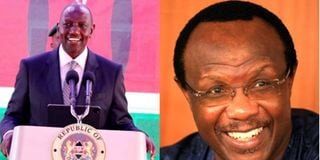David Ndii: The unlikely Ruto ally who has become his trusted confidant

President William Ruto (left) and the chair of his Presidential Council of Economic Advisors Dr David Ndii.
Many might have expected that Dr David Ndii would face a severe tongue-lashing after the frank and candid interview with Citizen Television last Monday in which he admitted his exasperation at the level of waste in government, and the fact that nobody saw the need to do anything about it.
Instead, President William Ruto the following day lauded the chair of his Presidential Council of Economic Advisers for effectively devising the programme allowing Kenya to buy fuel from Saudi Arabia and Qatar on credit terms, easing the frantic search for American dollars with every monthly import cycle.
The President spoke at a function on release of a public service performance contracting charter, later repeating the same on Twitter: “My economic adviser, David Ndii, Mohamed Hassan (also a member of the Council of Economic Advisers), Davis Chirchir (Cabinet Secretary for Energy) and the young man at EPRA (name not mentioned but presumably Energy and Petroleum Regulatory Authority Director-General Daniel Kiptoo) have done something phenomenal; they have managed to put together a programme that has taken us away from looking for $500m every month to buy our fuel needs which was snowballing into a crisis... today we can buy fuel in Kenya shillings, which nobody thought was possible”.
That he chose to laud Ndii just a day after the interview was a vote of confidence as some might have expected he was becoming increasingly exasperated with the plain-spoken economic czar, whose numerous Twitter posts often seem to contradict government messaging.
Ruto, though, appears to have been misled on the constant refrain that the government-to-government oil import deal will be paid for in Kenya shillings as it is clear in the contracts that Qatar and Saudi Arabia will be paid in US dollars. However, there is something positive in that the monthly rush to secure dollars possibly eases immediate pressure on a fast-depreciating local currency. Ruto went as far as to publicly proclaim that the Kenya shilling should in the next two months strengthen to between KSh115 and 120 to the US dollar, from the present low approaching KSh140 on a developing parallel market higher than the stated bank rates of rates of around KSh133. Also, government self-congratulations on the deal ignore the fact that buying on credit only postpones a crunch that could still come when the debt falls due in six months.
Anyway, the real story now is the self-described ‘public intellectual’ who has become the face and voice of the Ruto government’s economic strategy. With his outspoken views, usually enunciated on Twitter, he often eclipses Treasury Cabinet Secretary Njuguna Ndung’u. His frank and unconventional views on politics, governance, economics and the Kenya Kwanza strategy are sometimes so brutal that they have key coalition figures wincing, wondering if he is undermining the government from within or signalling an impending exit.
Expensive subsidies
Ndii himself, however, gave a hint of what was at play during the interview, revealing that it was on his advice that Ruto bit the bullet and, immediately on taking office, declared an end to the expensive subsidies on petroleum and maize flour imposed by President Uhuru Kenyatta’s government as the 2022 election campaigns hit the home stretch.
The acclaimed scholar – who served as adviser to President Mwai Kibaki’s much-lauded economic recovery strategy between 2002 and 2013, and then as opposition leader Raila Odinga’s economic policy chief between 2013 and 2017 – is famous, or infamous, for speaking his mind without regard to political sensibilities.
He is credited with conceptualising Ruto’s ‘Bottom Up’ economic policy mantra and crafting the campaign manifesto, and was widely tipped to occupy a senior executive position in the Kenya Government, such as Treasury Cabinet Secretary or Principal Secretary. Either of the two posts, according to campaign insiders, would have been his for the asking. But instead, he preferred to take a background advisory post, crafting policy and strategy and leaving others to manage the implementation.
From his Twitter activity and media appearances, however, Ndii is not one to remain the invisible backroom operator. Whether serving Kibaki, Raila and now Ruto, he remains an outspoken gadfly within any organisation, speaking the hard truths few dare to utter, stressing the politically risky policy positions and ruffling feathers from within.
His Twitter activity and other public pronouncements since Kenya Kwanza took office are often the first signals that campaign promises will not necessarily be met, and that Kenyans, particularly the ‘Hustler Nation’, will have to lower their expectations. He has publicly dismissed presumptions, for instance, that Kenya Kwanza undertook to lower the prices of electricity, fuel and food - the very issues at the centre of opposition protests on cost of living.
Citizen TV interview
There are many in the Ruto government who remain suspicious of Ndii and his motives. On discussion groups populated by Kenya Kwanza adherents, questions are asked about whether he is really helping the regime with his Twitter engagements. In the wake of the Citizen TV interview, critics within were extremely uncomfortable and had begun to sharpen their knives until Ruto’s implicit vote of confidence.
Approached by The Weekly Review on how Ndii’s pronouncements are taken within the party, Murang’a Governor Irungu Kang’ata pleaded that he now only comments on county rather than national issues. This despite the fact that he writes a weekly column in Kenya’s best-selling newspaper, the Sunday Nation, where he gives opinions almost exclusively on national issues.
Senate Majority leader Aaron Cheruiyot was more forthright, acknowledging there may be frictions but the party has to learn to accommodate his ways: “Ndii’s style of work is non-conventional. It has many of our team members greatly concerned with his didactic ways. Some conspiracy theorists even hold the view that he never really left the opposite camp. However, he enjoys the full confidence of the boss as he is quite good at his job.
The senior politicians in the administration are rather concerned that he has a habit of veering off his course of duty and makes what many consider to be reckless political statements. They have no issue with his views on the economy.
Supremely self-confident intellectual
“I don’t think he is about to change; given that he is fairly single-minded. So basically, the team will have to learn to live with him as is,” observes Cheruiyot. There is no doubt that Ndii comes across as a supremely self-confident intellectual who does not suffer fools gladly. If many in the Ruto inner circle suffer the arrogance of power, it might be fair to say that he suffers, or is blessed, with the intellectual arrogance that frames much of his discourse. The economic adviser, for instance, openly proffered on Twitter that a bloated government, as in Ruto’s appointment of 50 Cabinet Administrative Secretaries at a time when official exhortations were on belt tightening, was a necessary political investment.
“The first obligation of a government is survival and political stability. The more the dynasties (in reference to Raila and Uhuru) foment destabilisation the more we will have to spend on political capital”.
And in typical fashion, he concluded with an option that would be anathema to the key figures around Ruto: “If push comes to shove, handshake is always an option”. That basically means cutting a deal with Raila so that he calls a halt to political protests. He put it in very crude terms, about using scarce public funds to ‘buy’ the veteran opposition leader.
Ndii was also very candid around the sensitive issue of delayed public service salaries for the first time in independent Kenya.
While colleagues such as National Assembly Majority Leader Kimani Ichung’wah were in denial or keeping uncomfortable silences, Ruto’s economic adviser put it starkly that it had to be a choice between paying salaries or paying government debts, and the latter had to take priority.
That would be cold comfort for thousands of public service employees who were facing the prospect of Easter holidays without their march salaries, but Ndii is not one to be slowed down by such concerns.
If anything, he seemed to have emboldened others to admit that the situation was dire, with Ruto following up later with his first comments on the delayed salaries. He stressed that the government would not borrow to pay salaries but wait for resources generated internally, playing up the narrative of blaming the cash crunch on the Uhuru administration’s penchant for borrowing.
Emptying the Treasury
Others, such as Deputy President Rigathi Gachagua and Ichung’wah, found room to tear into Uhuru for allegedly emptying the Treasury and leaving empty coffers for Kenya Kwanza to inherit, excuses that have been repeated at every opportunity with no proof ever offered of massive looting. Ndii was always an unlikely Ruto ally, but has become a trusted confidant, and also one of the few insiders ready to tell the President some hard truths away from the ritual praise-singing.
The economic adviser is so far the only person in government brave enough to broach the issue of cutting the bloated government wage bill through retrenchment, in addition to shutting down or selling parastatals and State agencies that can no longer justify their existence.
Layoffs would be advocated by the IMF and World Bank twins as a rational way of slashing government expenditure, but would be a political hot potato that even Ruto would approach very cautiously. It might seem rather hypocritical that Ndii would advocate retrenchment in the public service whilst supporting appointment of CASs as political rewards.
The President seems to appreciate his honest and forthright approach to issues, in addition to shared antipathy to the Kenyatta ‘dynasty’. When he served as Raila’s adviser, Ndii was one of Ruto’s most brutal critics.
On Twitter and elsewhere, he brutally tore into Ruto on his alleged corruption, typifying him as one who in leadership would oversee rapid destruction of public institutions.
He can be a contradiction in terms. He was co-founder of the Institute of Economic Affairs, Kenya’s first public policy think-tank that was partly funded by the same local ‘dynasties’ he now eviscerates with passion. The Institute gained credibility for its groundbreaking surveys on corruption in Kenya during the Moi years.
British newspaper The Telegraph described him as “one of Africa’s best known economists and an outspoken anti-corruption crusader”, but once latched onto Ruto coattails, Ndii deliberately abandoned his anti-corruption credentials. While he had harshly criticised unchecked graft under the Uhuru-Ruto regime, he suddenly changed tune to dismiss the anti-corruption crusade as of no more consequence.
Teamed up with Uhuru
Ndii ditched Raila in 2018 after the latter teamed up with Uhuru following the famous post-election handshake. He played a key role in the court cases leading to collapse of the ‘handshake brother’s’ ill-fated Building Bridges Initiative. He also made it clear that his key motivation henceforth was to counter any prospect of the Kenyattas retaining political influence, and for that he was prepared to get into bed with the devil.
Hence his moving into the Ruto camp and driving policy positions that were grounded first of all on cutting the Kenyatta’s down to size. The Hustler versus Dynasty crusade is not an accident but a very well thought out agenda which, even after the elections, is still being played out in anti-Kenyatta diatribes driven by the likes of Gachagua, as well as very clear attempts to hit the former First Family where it might hurt most - their economic base.
As long as he enjoys Ruto’s confidence, Ndii can be secure in his job, but he also has to be aware that at some point he might step on too many toes, especially with the undisguised contempt he reserves for those not on his intellectual level. In a previous discussion with The Weekly Review, Raila recalled how his 2007 campaign manifesto, largely authored by Ndii, was deemed too high-brow and academic. He resisted pleas to revise it, so the task was given to others and the campaign ended up with two competing documents.
He can be inflexible and arrogant, and the irony is that in 2022, the Raila camp was accusing Ruto of stealing their manifesto. It was Ndii they stole, and in the process also stole Raila’s traditional platform as the voice of the underdog, the voiceless and the marginalised.
This article was first published in the Weekly Review.





